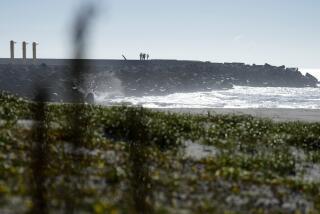Japanese Lawmakers Protest Rice Policy Change
TOKYO â Bundled up against the cold winter air, a group of Japanese legislators launched a 48-hour hunger strike Tuesday to protest what appears to be the impending opening of this nationâs sacrosanct rice market.
Cutting ghostly silhouettes in front of the deserted Parliament building, the Liberal Democratic Party members appealed to the world to understand the importance of rice to their farmers and Japanâs ability to feed itself.
The group, initially nine but expected to total about 30 in all, warned that forcing open the rice market would create an anti-American backlash. It would also destroy the nationâs environment and hurt the worldâs 1 billion undernourished people because rich Japan would start snapping up limited rice supplies and hoarding it, they argued.
âThis could create a worldwide food problem,â declared Hiroyuki Arai, a legislator from the rice-growing prefecture of Fukushima in northern Japan. âThe biggest international contribution Japan can make is not to let foreign rice in.â
Such doomsaying arguments underscore the mounting tensions here, as reports grow that Prime Minister Morihiro Hosokawa is ready to announce next week that Japan will partially lift its ban on rice imports.
Japan is under extreme pressure to lift its ban--the holiest of the nationâs sacred cows--to help bring a successful end to the seven-year Uruguay Round of global trade talks, the present discussions on the General Agreement on Tariffs and Trade. The talks must be concluded by Dec. 15.
For weeks, the Japanese press has reported that the United States and Japan have struck a deal under which Japan would get a six-year grace period for replacing its import ban with tariffs. In exchange, Japan would import 4% to 8% of its annual domestic consumption of 10 million tons.
Under the plan, the two sides would renegotiate the tariff issue after six years. That ambiguous clause allows the Hosokawa government to say it is not changing the national policy against tariffs, even as it reportedly moves forward with the compromise plan.
As the GATT deadline draws near, skirmishes are heating up on both sides. California rice is being publicized as unsafe and contaminated with pesticide residue, according to recent tests of Japanese and foreign rice by so-called consumer groups. Farmers from Taiwan and South Korea are flying to Tokyo to hold âsolidarity protests.â
At the same time, the Hosokawa government appears to be ever so gently paving the way for a formal announcement on rice by sending out messengers to drop hints.
On Tuesday, Agriculture Minister Eijiro Hata hinted to the Parliament that Japan may accept partial liberalization because GATT appeared ready to reject Japanâs plea for an exception. His remarks that Japan might have to change its food control laws, should that situation arise, follows remarks Sunday by chief Cabinet Secretary Masayoshi Takemura that the partial liberalization plan doesnât necessarily contradict past government positions on rice.
GATT officials also will soon propose the six-year grace period for Japan as part of a compromise plan to be put forward by Germain A. Denis, head of the market-access negotiating group, Kyodo News Service reported.
Meanwhile, the South Korean press has begun reporting that Japanâs concessions were forcing Seoul to consider opening its heavily protected rice market, as well. The government is studying the âJapan formulaâ and is discussing a 10-year grace period in return for imports of 2% to 5%, Korean papers say.
In the face of such reports, three South Korean legislators were scheduled to join the hunger strike late Tuesday.
For Tadahiro Matsushita, a newly elected legislator from Kagoshima on the southern island of Kyushu, opening the rice market will be the last straw for his local farming constituents. Already this year, theyâve been devastated by floods and an unusually cool summer that led to the most disastrous crop failure in nearly 50 years.
âOpening the rice market will crush the farmers,â Matsushita fretted, as he bundled up in a sleeping bag and thick winter gloves.
He, like his fellow strikers, said they were bound to honor public campaign pledges to protect agriculture. They criticized Hosokawa for continuing to deny reports of a compromise rather than openly debating the issue in the Parliament, as they contend a democracy demands.
Toshikatsu Matsuoka, the hunger strike leader from Hosokawaâs prefecture of Kumamoto, said Japanese polls showing that the majority supports liberalization are misleading, because most people donât understand the issue. Although most believe they will be able to buy cheaper rice, in fact Japanâs purchase of rice will likely drive prices up worldwide, he said.
He also castigated the United States for its âegotisticalâ manner of demanding markets open in Japan while maintaining its own protections on sugar, peanuts and other commodities.
âAmericans are a people with a strong sense of fairness,â Matsuoka said. âI want to tell them that we should realize a GATT agreement that is fair to all, not just a one-sided benefit or loss.â
* URUGUAY ROUND TALKS
Crucial next steps could occur today in Brussels. D2.
More to Read
Sign up for Essential California
The most important California stories and recommendations in your inbox every morning.
You may occasionally receive promotional content from the Los Angeles Times.










